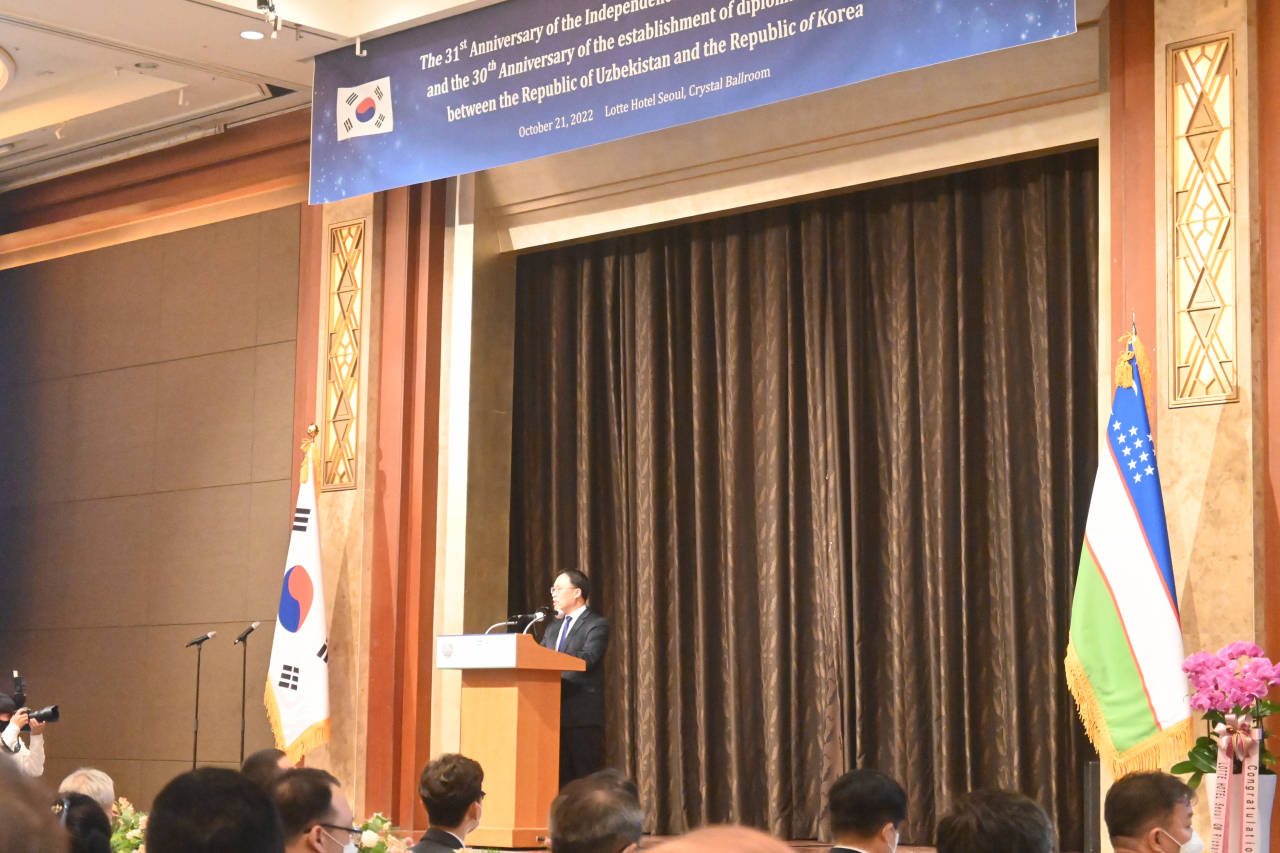 |
Artists perform a traditional song and dance during the reception of Uzbekistan’s 31st independence Day at Lotte Hotel, Seoul, Friday. (Sanjay Kumar/The Korea Herald). |
Uzbekistan became part of the Soviet Union in 1924 and later declared its independence on Aug. 31, 1991.
As the country regained its independence, its ancient history, rich cultural heritage, national religious values and identity were restored, Uzbekistan Ambassador to Korea Vitaly Fen told The Korea Herald in remarks ahead of the event. Fen was unable to attend the celebration due to the recent death of his wife on Oct. 17.
Delivering a welcoming address on the ambassador’s behalf, the Uzbekistan Embassy's deputy chief of mission Zokir Saidov highlighted the trust in Uzbekistan-Korea relations and expressed commitment to their special strategic partnership.
 |
Uzbekistan's 31st Independence Day celebrations at Lotte Hotel in Seoul. (Sanjay Kumar/The Korea Herald) |
"Hundreds of priority investment projects in various sectors of our country's economy have been implemented by the leading South Korean companies and about 900 enterprises with the participation of Korean investors," he said.
"Volume of investments attracted from the Republic of Korea have exceeded $7 billion," he emphasized.
Saidov noted long-term fruitful cooperation with the Export-Import Bank of Korea and the Economic Development and Cooperation Fund.
"Volume of financing within this fund has reached $1 billion. Significant funds are being allocated to the implementation of new projects in Uzbekistan by 2023," he said.
"A fruitful partnership with the Korea International Cooperation Agency is also expanding," according to Saidov. "Vast opportunities for businesses are opening up in Uzbekistan, which has long been a center of trade, science and culture."
Saidov also highlighted "Day of the Uzbek Language," celebrated Oct. 21, as another important date for Uzbekistan at the event, saying Uzbek has been granted the status of state language.
 |
Ambassadors and representatives of the Diplomatic corps pose for a group photo at Uzbekistan's 31st Independence Day celebration at Lotte Hotel in Seoul on Friday. (Sanjay Kumar/The Korea Herald) |
"Nowadays, the Uzbek language is studied in about 60 universities and in more than 100 schools in many countries around the globe,” said Saidov, adding the Uzbek language is also taught in South Korea.
"Within the framework of establishing close inter-regional relations, mutual cooperation between Tashkent and Seoul, Fergana and Incheon, Samarkand and Gyeongju, Bukhara and Daegu and a number of other cities is developing day by day," said Saidov.
He said that Uzbekistan and Korea strongly cooperate in the fields of health care, preschool and higher education.
"As a result of the first major joint project implemented in medicine, the Children's Multidisciplinary Clinic started operating in Tashkent city in 2020," he said, stressing the Korean education model as one of the most exemplary in the world.
"Preschool education system in Uzbekistan has been completely reformed based on the advanced experience and knowledge of our partners from Korea," he said.
"To develop innovative cooperation between universities and in order to create a permanent platform for their regular communications, it is planned to hold a forum for the leadership of higher education institutions of the two countries in Tashkent later this year," he said.
 |
Guests and representatives attend the anniversary cake cutting ceremony in the reception of Uzbekistan’s 31st independence Day at Lotte Hotel, Seoul, Friday. (Sanjay Kumar/The Korea Herald). |
Saidov referred to the unveiling of a statue of poet Alisher Navoi in Seoul in December last year as a huge historical event in the spiritual life of Uzbekistan and Korea.
"Culture and customs of Uzbek and Korean people are very similar," he said. "Closeness of the mentality of the people and the large Korean diaspora in Uzbekistan play an important role in the development of the friendly relations."
"Uzbekistan and Korea supported each other during difficult times," he said, stressing that more than 180,000 ethnic Koreans who reside in Uzbekistan today are an integral part of the Uzbekistan society.
“Uzbekistan will move to the next level of development under the outstanding leadership of President (Shavkat) Mirziyoyev in the future too,” said Choi Young-sam, the Korean deputy minister for political affairs, referring to the Korean government’s aim to become a global hub.
 |
Choi Young-sam, Korean deputy minister for political affairs, delivers remarks at Uzbekistan's 31st Independence Day celebration at Lotte Hotel in Seoul on Friday. (Sanjay Kumar/The Korea Herald) |
Choi applauded frequent high-level exchanges and bilateral cooperation, mostly in the energy, infrastructure and manufacturing sectors.
Choi underlined that Korea has become one of Uzbekistan’s largest trading partners, pointing to significant bilateral achievements after the forging of Uzbekistan-Korea diplomatic relations in 1992.
“More than 400 Korean companies are actively doing business in Uzbekistan,” said Choi.
According to Choi, Uzbekistan-Korea cooperation is expanding into more diversified and future-oriented areas such as digitization, the environment, and education.
He also marked the 85th anniversary of the settlement of ethnic Koreans in Central Asia.
“Ethnic Koreans since have been a strong bridge connecting Uzbekistan and Korea,” Choi said.
Meanwhile, Korean National Assembly Rep. Kim Du-kwan applauded Uzbekistan and Korea for their continued cooperation and face-to-face diplomatic activities in trade, economy and technology, even amid the COVID-19 pandemic.
 |
Korean National Assembly member Kim Du-kwan delivers congratulatory remarks during the celebration of Uzbekistan’s 31st Independence Day at Lotte Hotel in Seoul, Friday. (Sanjay Kumar/The Korea Herald) |
“The joy of independence is remembered during the harsher period when all citizens pick up a broom and clean the neighborhood,” Kim said, referring to an Uzbek adage.
The event was attended by representatives of the government, ministries, media, local companies, heads of diplomatic missions and compatriots working and studying in South Korea.







![[Today’s K-pop] Blackpink’s Jennie, Lisa invited to Coachella as solo acts](http://res.heraldm.com/phpwas/restmb_idxmake.php?idx=644&simg=/content/image/2024/11/21/20241121050099_0.jpg)